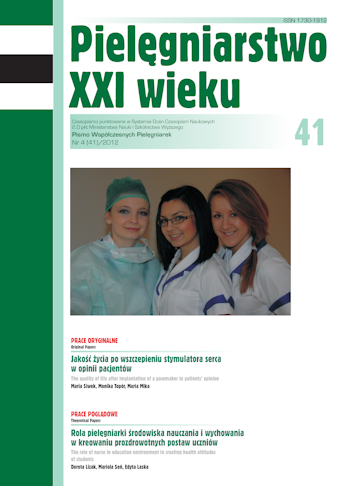The first degree studies of nursing – perceptions and reality
Keywords:
choosing a profession, nursing course, ideasAbstract
THE FIRST DEGREE STUDIES OF NURSING – PERCEPTIONS AND REALITY
Introduction. Choosing a profession is not easy for an experienced adult. It is even more difficult for a young adult graduating from a secondary school. This is related to a number of factors that can affect the decision making, which include not only the individual's personality or abilities, but also conceptions shaped by family, close environment, stereotypes, or mass media. A well-chosen profession, meeting our expectations, predispositions and conceptions, enables self-realization and fulfillment.
Aim. The purpose of this study was to identify determinants of career choice as well as conceptions and statements about the nursing profession
Materials and methods. The study covered 40 nursing graduates of undergraduate studies at the Faculty of Health Sciences at the University of Bielsko-Biała. The method used in the study was diagnostic survey using the original questionnaire.
Results. For 90% of the respondents this profession gives satisfaction of providing constant support and care to people and allows to mitigate and reduce the suffering of the sick. For 57.5% of respondents the concept of the profession, in the course of their education, has changed partially, for 27.5% of them it changed completely, while for 15% - it remained unchanged. The same studies would have been chosen again by 70% of students, while 27.5% would have started other studies.
References
1. Timoszyk – Tomczak C. Strategie konstruowania własnej przyszłości. Szczecin: Wyd. Naukowe Uniwersytetu Szczecińskiego; 2003, s. 44-48.
2. Kropiwnicka E, Orzechowska A, Cholewska M iwsp. Determinanty wyboru zawodu, poziom aspiracji oraz plany na przyszłość studentów kierunku lekarskiego i pielęgniarstwa Uniwersytetu Medycznego w Białymstoku. Problemy Pielęgniarstwa. 2011; 19 (1): 70-80.
3. Beggs J, Bantham J, Taylor S. Distinguishing the factors influencing college students' choice of Major. College student Journal. 2008; 42(2): 381 – 394.
4. Wrońska I, Mariański J. Etyka w pracy pielęgniarskiej. Lublin: Wyd. Czelej; 2002, s. 84.
5. Korczak M. Refleksje na temat kodeksu etyki zawodowej polskiej pielęgniarki. Studia medyczne. 2008; 9: 93-95.
6. Informacja prasowa w sprawie hasła obchodów Międzynarodowego Dnia Pielęgniarek w dniu 12 maja 2012 http://www.ptp.na1.pl/pliki/pdf/IND_Inf_Prasowa_2012.pdf.
7. Piotrowski W. Wpływ edukacji na prestiż zawodowy pielęgniarki. Materiały Międzynarodowej Konferencji Naukowej. Prestiż zawodowy pielęgniarki w Polsce i w Europie, Legnica. Zeszyt Naukowy. 2011; 1(10).
8. Zysberg L, Zisberg A. Nursing students' expectations of the college experience. Journal of Nursing Education. 2008;47(9): 389-95.
9. Ching Li Gwendoline Tan-Kuick, Yong Ngee Keith Ng. Influences on Students’ Choice of Nursing Education in Singapore – An Exploratory Study. Journal of Applied Business and Management Studies. 2010; 1:1-10.
10. Merav Ben Natan, Becker F. Israelis’ perceived motivation for choosing a nursing career. Nurse Education Today. 2010; 30: 308–313.
11. Erickson J et al. Why not nursing? Nursing. 2005; 35(7):46-49.
12. Warren Stomberg M, Nilsson K. Nursing Students’ Self-Graded Motivation to Complete their Programme of Study. The Open Nursing Journal. 2010; 4: 42-47.
13. Binkowska-Bury M, Marć M, Sobolewski M. Orientacja życiowa a czynniki motywujące młodzież do podejmowania kształcenia w zawodzie pielęgniarki w oparciu o badania studentów kierunku pielęgniarstwa Uniwersytetu Rzeszowskiego. Przegląd Medyczny Uniwersytetu Rzeszowskiego. 2005; 2: 149-155.
14. Leoniuk K, Lemska M, Nowakowska H. Wyobrażenia studentów pielęgniarstwa na temat zawodu i pracy w systemie opieki zdrowotnej. Ann. UMCS Sect. D. 2005; 60: 256-259.
Downloads
Published
Issue
Section
License
Copyright (c) 2012 Małgorzata Fraś (Autor)

This work is licensed under a Creative Commons Attribution 4.0 International License.




